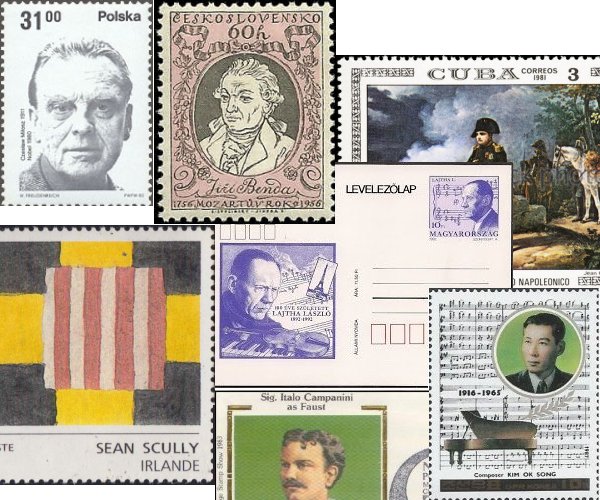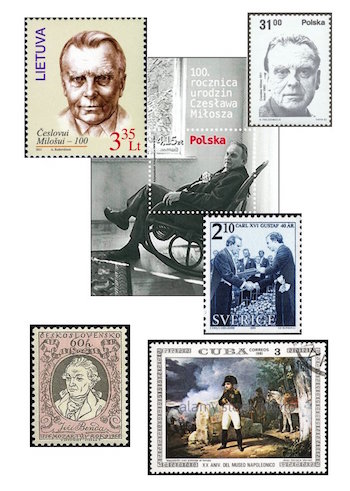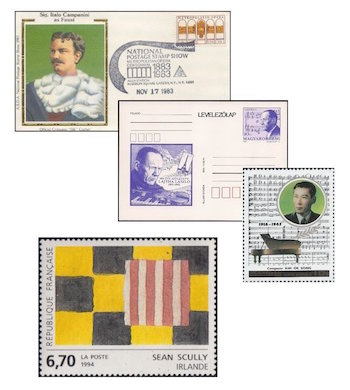The Arts on Stamps of the World — June 30
An Arts Fuse regular feature: the arts on stamps of the world.

By Doug Briscoe
Other than Czesław Miłosz, there are no heavy hitters on today’s Arts on Stamps of the World, but the up side is, maybe we’ll learn something new. Today is the birthday of three composers, Jiří Antonín Benda, László Lajtha (pronounced more or less like LOY-ta), and Kim Ok-song, Italian tenor Italo Campanini, and painters Émile Vernet and Sean Scully.
Poet Czesław Miłosz (CHEH-swahf MEE-wosh; 30 June 1911 – 14 August 2004) was Polish and wrote in that language but also felt a strong connection to his Lithuanian heritage. He published his first poetry volume in 1934. Having kept a low profile during the Nazi occupation (while he did quietly give assistance to Jews, he regarded the Warsaw Uprising as feckless and doomed and in any case was not sympathetic to the authoritarian tendencies of its leaders), he emerged as a diplomat, only to defect to the West in 1951. Two years later he saw into publication his prose work The Captive Mind, an analysis of intellectualism under totalitarianism. He came to the U.S. in 1960, became a citizen in 1970, and won the Nobel Prize for Literature in 1980. After the fall of Communism he divided his time between homes in the United States and Kraków, where he died at the age of 93. One of his English language translators is BU’s Robert Pinsky.

Bohemian composer Jiří Antonín (or Georg Anton) Benda (30 June 1722 – 6 November 1795) came from a large family of professional musicians. Even today, the tradition continues with Christian Benda, a cellist and conductor who has made recordings for Naxos. Our Benda served Frederick the Great and wrote much instrumental and church music as well as works for the stage, including melodramas (spoken word with orchestral accompaniment) like Ariadne auf Naxos and Medea (both 1775), which were both admired by Mozart.
The Vernet family also had something of a franchise, in their case, painting. The father and grandfather of Horace Vernet (30 June 1789 – 17 January 1863) were both painters, and he was actually born in the Louvre, an auspicious beginning if ever there was one, as his parents were staying there during the Revolution. Horace was generally not interested in classical subjects, though he did paint a Judith and Holofernes using Rossini’s wife Olympe Pélissier as a model. Vernet preferred genre paintings of contemporary figures, especially soldiers, from which he turned to battles, his métier, and the stamp shows us his Napoleon in Charleroi (1815). Vernet did also execute portraits as well as portrayals of Arabian subjects. Since we had a Rubens stamp the day before yesterday for that artist’s Lion Hunt, I thought I’d link to a Vernet picture on the same subject in an Arabian setting.
No stamp has been released in Italo Campanini’s honor, but his image appears on the cover of an envelope issued in connection with the centenary of the Metropolitan Opera. Campanini (June 30, 1845 – November 14, 1896) was born in Parma and made his debut (in Odessa!) as Manrico in Verdi’s Il trovatore in 1869. He achieved great success in London and New York, joining the Met in 1883 (until 1894). With another New York company he produced the American première of Verdi’s Otello in 1888.

Composer László Lajtha (1892 – 16 February 1963) is also stampless, but Hungary did issue this postal card for his centennial in 1992. In the early years of the 20th century Lajtha worked with Bartók and Kodály in transcribing Hungarian folk song. He served as an artillery officer in WWI, and his orchestral work “In Memoriam” was the first new composition to be premièred in Budapest after WWII. In the new regime he was, Wikipedia tells us, “appointed Director of Music for Hungarian Radio, director of the Museum of Ethnography and of the Budapest National Conservatory”, but lost all those posts and had his passport confiscated after he stayed “too long” on a working trip to London. And yet “in 1951 he was awarded the Kossuth Prize for his activities in folk-music research.” Following his support of the 1956 uprising his music was suppressed in Hungary, but well after his death it began to appear on state-issued Hungaroton recordings. Among these I would particularly recommend his lovely Nocturnes for soprano, harp, flute, and string quartet (1941), the String Quartets #5 (aka “5 Etudes”; 1934) and #10 (1953), and the Hommages for wind quartet and Sinfonietta #1 (both 1946). Most of these were reissued on CD, and the Marco Polo label has released discs of all nine of his symphonies and other orchestral works, including the aforementioned “In Memoriam”.
Kim Ok-song (1916-1965) served the North Korean government as vice president of the Central Committee of the Korean Musicians Union and wrote patriotic songs. His first work though, was an operetta called The Princess of Rangnang (1942 or, according to French Wikipedia, 1945). Other works include a Cantata, “The Yalu River”, and an orchestral work, The Countryside in Spring.
Sean Scully was born in Dublin (on this day in 1945) but has lived in the United States since the 70s, with homes also in Barcelona and Munich. He paints abstracts in oils and has a couple of pieces in the MFA, including Wall of Light Pink (1998). The French stamp from 1994 offers Abstract Squares, decidedly representative of Scully’s work.
A graduate of the University of Massachusetts with a B.A. in English, Doug Briscoe worked in Boston classical music radio, at WCRB, WGBH, and WBUR, for about 25 years, beginning in 1977. He has the curious distinction of having succeeded Robert J. Lurtsema twice, first as host of WGBH’s weekday morning classical music program in 1993, then as host of the weekend program when Robert J.’s health failed in 2000. Doug also wrote liner notes for several of the late Gunther Schuller’s GM Recordings releases as well as program notes for the Boston Classical Orchestra. For the past few years he’s been posting a Facebook “blog” of classical music on stamps of the world, which has now been expanded to encompass all the arts for The Arts Fuse.
